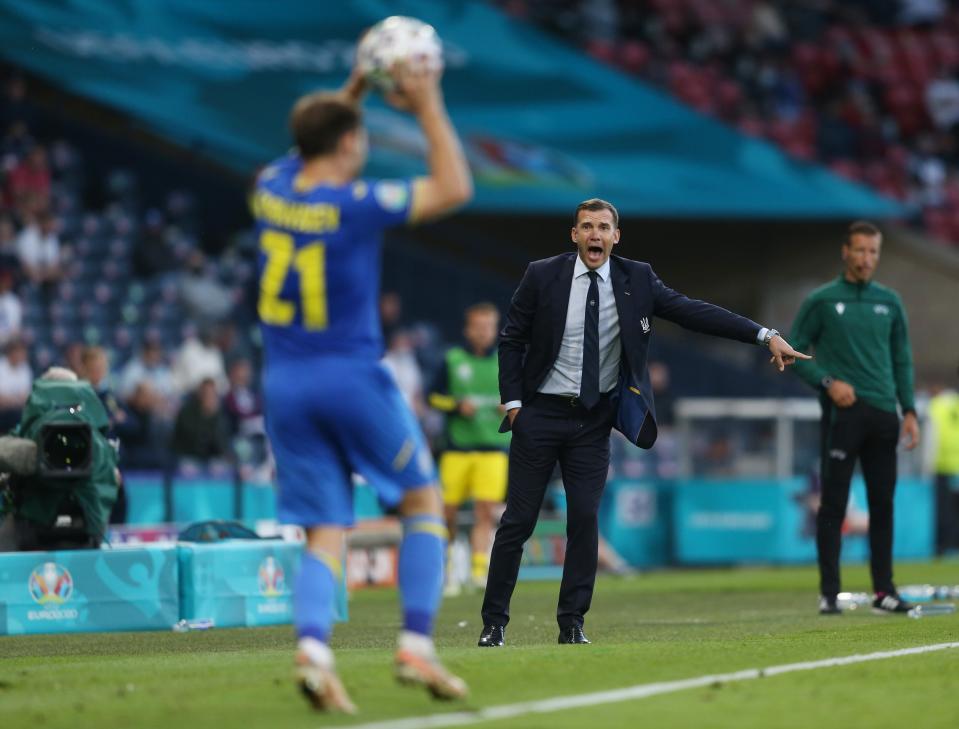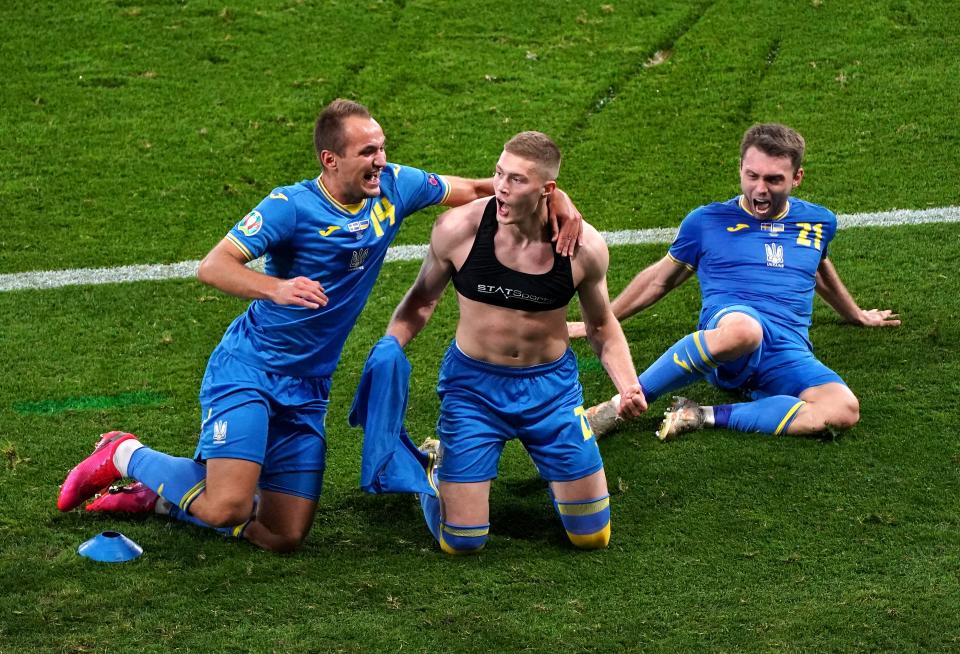Andriy Shevchenko using stats and science to plot England’s Euro 2020 downfall

Being as fitness-obsessed as he is, Andriy Shevchenko occasionally assesses himself with Ukraine’s super-advanced technology. He can monitor his own performance as he gets involved in training drills or matches with the team, and there is still a thrill that goes around some of the younger players when he does.
Shevchenko may be their manager, but he is also the greatest sporting hero in Ukraine’s history. It takes some a few sessions to snap out of the fact they are playing with a legend, whatever about being coached by one. The 44-year-old can’t quite keep up with them, but that isn’t because of waning legs. Shevchenko is still very fit. It’s just that he and his staff have honed one of the fittest teams in Europe. Shevchenko is left to offer a bit of poise, and some touches his players can’t pull off.
That can be awkward with some managers, and everyone has heard the stories about how uncomfortable Glenn Hoddle made some players like David Beckham feel by displaying his own talent. There is none of that with Shevchenko. His man-management is excellent. He is too liked. For all his aura, he isn’t perceived as arrogant in any way. It’s the same personality that has seen him become one of Roman Abramovich’s most trusted voices on football. The Chelsea owner used to regularly call Shevchenko for advice, sometimes for the most significant decisions at the club.
It’s a long way from the mirth that accompanied that infamous anecdote that Abramovich issued statements through Shevchenko to the Chelsea squad after the 1-1 draw against Rosenborg in 2007, the last match of Jose Mourinho’s first spell at the club.
The Ukrainian's own spell at Chelsea is the one low point of a stellar career, ensuring he is still something of a punchline in England. That would be sacrilege in Italy, where he remains one of the most revered players in the history of Serie A. He now returns there this weekend as a coach enjoying growing respect in the game.
There were even late moves to try and get him the Tottenham Hotspur job, before the appointment of Nuno Espirito Santo. The club liked Shevchenko but their one concern was that he’d never managed a club. It’s possible Spurs may end up feeling they have missed out. Some in England may regret mocking him.
Shevchenko has already guided Ukraine to the second best moment of their football history, having been central to their first. He drove the country to the quarter-finals of the World Cup as captain in 2006, and has now driven this team to the same stage of Euro 2020 as manager.
There is a deep belief they can do even more, and knock England out. They certainly believe they can outrun Gareth Southgate’s side, and maybe overwhelm them in play. Anyone that assumes Ukraine will be exhausted after extra-time against Sweden could do with looking more closely. Fitness is something Shevchenko and his staff pay more attention to than any team at Euro 2020. It is why it is impossible not to take him seriously as a coach.
That marks a huge difference from even a few years ago, when one top manager who has worked in Italy dismissed him as a lightweight. It is something that often happens with legendary players, as they are indulged with representative roles for their past careers, but not really respected. Those at AC Milan knew that was a mistake with Shevchenko. They quickly realised he is a thoughtful and intelligent figure, with strong ideas about the game.
He isn’t a Pep Guardiola in terms of the depth of his thinking on football, but he knows how he wants to play and – more importantly – knows who to appoint in order to develop it. Shevchenko’s Italian backroom staff speaks volumes, not least about his astuteness. For structure, there’s fellow Milan legend Mauro Tassotti as assistant, Shevchenko having persuaded him to leave the club after 36 years. For expertise, there’s one of the brightest analytical minds in the game in Andrea Maldera. For progressive style of play, there’s Maurizio Sarri protégé Luigi Nocentini. For fitness, there’s 2015-16 Leicester City conditioning coach Andrea Azzalin.
Ukraine’s team – the fourth youngest in the tournament – are super prepared. Shevchenko is no mere figurehead. The complexity to his character is illustrated in some of the complications about his own reputation back home. Shevchenko is loved in Ukraine, but he has still been criticised for not speaking the national language as the country goes through a particular nationalist moment. The very kit they wear sparked outrage in Russia for featuring an outline of the country that included Crimea, as well as the “Glory to Ukraine” slogan associated with forcing out pro-Moscow president Viktor Yanukovych.
Russian is one of Shevchenko’s first languages, along with English and Italian, pointing to his own international identity. He has still stressed that he is “deeply Ukrainian”, and promised to do a press conference in Ukrainian. Rather than the vagaries of language, though, Shevchenko is far more interested in the exactness of science. This is where his Ukrainian football identity really comes through.

As one of Valeriy Lobanovskiy’s favourite pupils, the young forward was completely ingrained in the managerial great’s ultra-scientific approach to the game. Lobanovskiy’s use of computation and scores of tests on players ensured his teams almost played like they were a computer programme.
When Shevchenko went to Milan, Lobanovskiy had him take detailed notes on all their preparations. That only deepened Shevchenko’s appreciation for the work of the famous “Milan Lab”. “The maths never lie,” he told James Horncastle.
It is little wonder Shevchenko is now so guided by science. While a lot of teams at Euro 2020 use StatSports’ GPS vests, Ukraine are the only team to wear them during games to get that extra depth of information. That could be seen after Artem Dovbyk whipped his shirt off to celebrate that late, late winner against Sweden.
It is fitting, in so many senses, since the goal was testament to Ukraine’s conditioning. Opta’s records say they have collectively run a total of 456.8km during Euro 2020 so far. That is the third highest in the tournament after Italy and Spain, and almost 50km more than England.
“Athletic data is so important to us,” Maldera told the PASS project. “They allow us to compare our performance with the best championships in a particular role, or compare our midfielder with that of the Italian national team in order to understand the potential in quantitative terms.”
All of this fuels some relentless football. This is another area where Shevchenko is a modernist. On taking the job in 2016, he immediately sought to move the Ukrainian team away from the counter-attacking approach that had become common with the team and in the international game as a whole. “We wanted to be more expansive and to have more control of the game through possession football, positive transitions,” Shevchenko said. “We wanted to be a team that creates lots of chances.”
As in every match, and as so beautifully illustrated with Oleksandr Zinchenko’s opening goal against Sweden, Ukraine will be taking the game to England and looking to get in behind them. “Italy is in some cases a similar team to us,” Maldera says. “Against serious opponents, the more time we give, the more difficult it will be.”

This is also why Shevchenko’s involvement in training games and drills is no mere indulgence. It has a tangible effect on the team, and deepens his own understanding of how they play. Shevchenko often does it to work out passing angles and moves from the players’ vantage points, while being aided by his assistants to the side and drones overhead.
Such completeness of information has given him and his staff genuine insights, like when Marlos was used as a false nine for the landmark 2-1 win over Portugal in qualifying, or the influential use of Ruslan Malinovskiy as a “false winger” against North Macedonia.
That was when this campaign really took off. For all the nationalist spirit swirling around the squad, there is a more natural team spirit within it. This is something else that Shevchenko’s personality brings. Zinchenko says it immediately lifted him when he came in extremely down after the Champions League final defeat with Manchester City.
Shevchenko knows it is the kind of psychology that complements the science. There was another pointed line in his interview with Horncastle. “You must always believe. You can turn a game around in the last second. There are lots of examples of big games being decided at the end, like Manchester United against Bayern in 1999. Two minutes is all it takes. Great teams have this mentality. When you coach top players, they have to believe games can come down to the last 10 seconds.”
The science allows this. The winner against Sweden proves it. It is now up to England to stifle it. Ukraine will look to put it up to them.
Read More
A closer look at Andriy Shevchenko’s Ukraine ahead of England showdown
Euro 2020 matchday 21: Battle of the big guns as Belgium prepare to face Italy
Oleksandr Zinchenko: Ukraine motivated not frightened ahead of England clash

